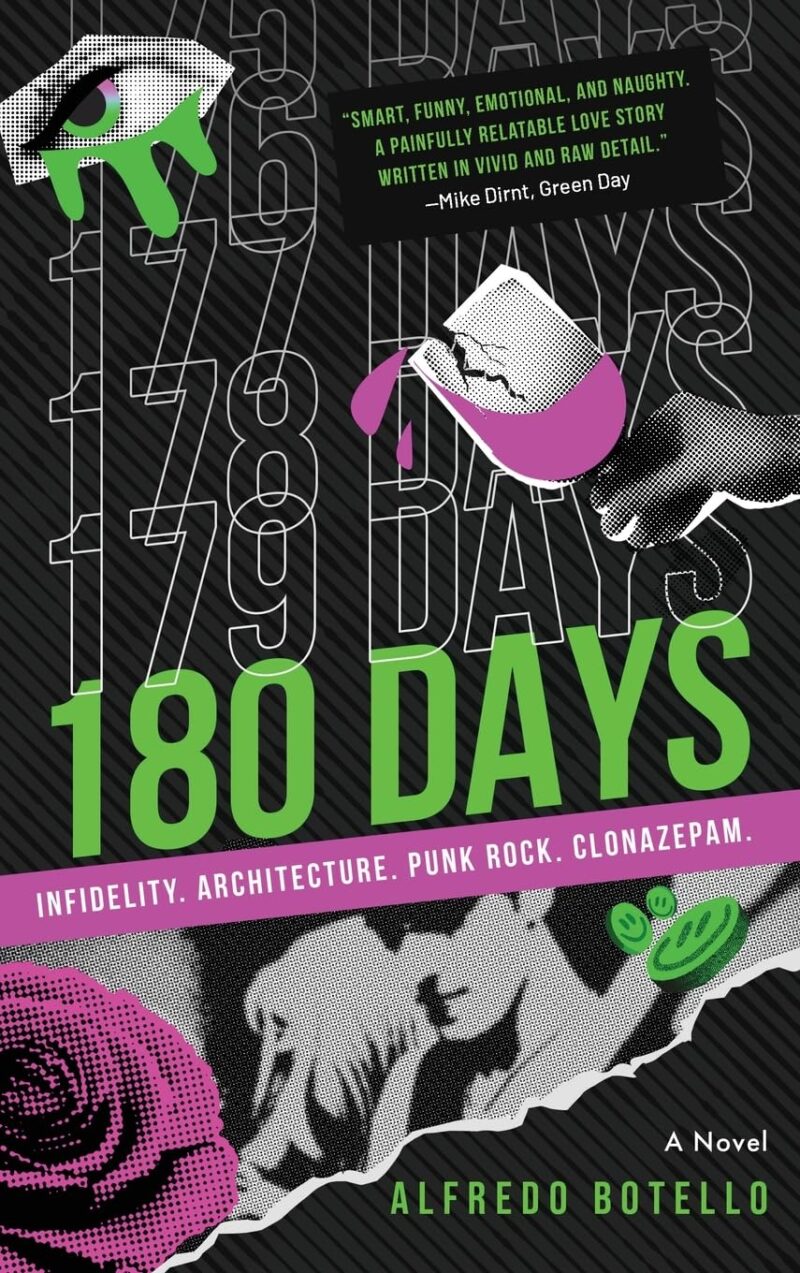In the realm of upmarket literature, where genres often find themselves confined to neatly defined boxes, Alfredo Botello’s debut novel, “180 Days,” emerges as a rebellious force, blending the raw energy of punk rock, the precision of architectural design, and the uncharted depths of love and redemption. It is a piece of writing that defies expectations yet delivers emotionally. Botello is a screenwriter by trade, and his gift for the cinematic, the visual, and the forward momentum of the well-paced scene, shines through. This literary concoction promises readers an immersive experience that transcends the ordinary.
Navigating the Complex Landscape of Love and Infidelity
At its core, “180 Days” is a love story, but it defies the conventions of traditional romance narratives. The tale kicks off with the revelation of infidelity, thrusting the characters, Tomas Araeta and Naomi Curran, into the tumultuous aftermath of betrayal. However, what distinguishes this narrative is its refusal to be a simplistic story of right and wrong. Instead, it plunges into the complexities of human desires, the pursuit of validation, and the quest for self-worth. Botello’s manipulation of the story’s timeline aptly amplifies the emotions and drama of the story he has chosen to tell: an exploration of the chaos of life and love.
A High-Octane Race Against Time
The novel unfolds against the backdrop of California’s mandated 180-day waiting period for divorce—a ticking clock that adds a layer of urgency to the narrative. Tomas Araeta, an aspiring architect, finds himself with a limited window to salvage his marriage. The race against time introduces an element of suspense that propels readers through the pages with bated breath, eager to discover the fate of the relationship.
Punk Rock and Architectural Elegance Collide
What sets “180 Days” apart is its audacious fusion of punk rock and architecture. Tomas Araeta seeks guidance from Evo Korman, the frontman of the iconic punk band The Pill Splitters, in a bid to repair his fractured marriage. The narrative takes readers on a backstage journey into the chaotic world of punk, offering unexpected insights and a thrilling exploration of identity. Korman is one of several very memorable, well rendered, characters in the novel.
Botello’s background as a Fulbright Fellow in architecture infuses the novel with vivid descriptions of the Bay Area, from the sleek lines of modern buildings to the eclectic charm of San Francisco and the East Bay. The narrative becomes a reflection of the intricacies of design—a delicate balance between order and chaos, mirroring the complexities of relationships.
A Celebration of Imperfections in a Perfect World
“180 Days” challenges the prevailing narrative of curated perfection in the age of social media. It celebrates imperfections, presenting a narrative that encourages readers to embrace the messy, flawed reality of life and relationships. In a world obsessed with façades, the novel becomes a rallying cry for authenticity and self-acceptance.
An Emotional Rollercoaster of Laughter, Tears, and Surprises
As the 180-day countdown unfolds, readers find themselves on an emotional rollercoaster—laughing, crying, and encountering unexpected connections. The novel is not merely a story; it’s an experience that pushes boundaries, challenges perceptions, and leaves an indelible mark on the reader’s heart. Tomas and Naomi are real people, a couple the reader can root for.
A Critical Review: Balancing Flaws and Flourishes
“180 Days” is a daring exploration of love’s complexities, weaving together the worlds of punk rock and architecture with finesse. The fusion of these disparate elements is both the novel’s strength and, at times, its challenge. While the audacious mix may captivate those seeking a unique literary experience, some readers might find the blend occasionally jarring, requiring an acquired taste for both punk culture and architectural nuances. For those intrigued by the journey, Botello does a virtuosic job of describing architecture and punk rock, and their importance, for both the neophyte and the afficionado
The narrative’s refusal to simplify the aftermath of infidelity is a commendable choice, offering a nuanced perspective on human desires and self-discovery. However, this complexity might be a double-edged sword for readers seeking a more straightforward resolution. The book is aimed at those who don’t see the world in black and white, but rather shades of grey.
Botello’s vivid descriptions of the Bay Area and architectural wonders showcase his prowess, creating a tangible backdrop for the unfolding drama. Yet, the detailed architectural discourse may occasionally feel overwhelming for readers less acquainted with the field. The book serves as a well written primer for design enthusiasts, but again, one must want to take the journey.
In its celebration of imperfections, “180 Days” stands as a refreshing departure from narratives that often succumb to societal pressures of portraying flawless characters. However, some may find the novel’s emphasis on authenticity occasionally veering into the realm of nihilism and biting, dark humor, challenging conventional notions without necessarily offering a clear alternative. Botello clearly holds a world view that does not always hew to conventional story telling.
Despite these nuanced critiques, “180 Days” remains a compelling journey into the complexities of love, self-discovery, and the intersection of seemingly disparate worlds. It invites readers to embrace the messy, imperfect reality of life and relationships, promising an emotional rollercoaster that transcends the boundaries of conventional storytelling.
Scheduled for release on December 12, 2023, by Koehler Books, “180 Days” is poised to captivate those who crave a symphony of punk, passion, and redemption in the literary landscape. Get ready for a unique narrative experience that challenges, entertains, and leaves an indelible mark on the soul.
Kindle Version: Click Here
Paperback Version: Click Here
Audiobook Version: Click Here
Hardcover Version: Click Here








